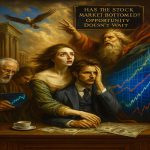Trade Smart: Avoiding Common Mistakes to Secure Your Investment Future
Jan 03, 2025
Trading in financial markets has captivated the minds of many, from the marble halls of ancient academies to the sleek offices of Wall Street. Its allure is timeless, promising fortune and success to those who can navigate its tumultuous waves. Yet, the path to trading mastery is fraught with obstacles. “Common Trading Mistakes are hidden reefs that can sink novice and seasoned traders’ ships. Understanding these errors is paramount in crafting a strategy that maximizes profit while minimizing risk.
The Stoic Trader: Avoiding Emotional Decisions
Like many aspects of life, trading is vulnerable to the whims of human emotion. In the context of Stoicism, as Marcus Aurelius practises, the emphasis on rationality and emotional control is particularly relevant. Aurelius, the Stoic emperor of Rome, would have found common ground with the modern trader, given that both are exposed to situations requiring clear-headed decision-making amidst potential chaos.
A Stoic trader would approach market fluctuations calmly, understanding that while they cannot control market movements, they can maintain their reactions. Emotions like fear and greed often cloud judgment, leading to impulsive decisions such as selling assets in a downturn out of panic or buying into a bubble out of FOMO (fear of missing out). Such decisions typically result in financial loss or missed opportunities.
For instance, during the Wall Street Crash of 1929, many traders sold their holdings frantically to cut losses. They did not realise that some of those assets were fundamentally sound and would regain or even increase their future value. A Stoic-minded trader, however, would have calmly assessed each asset’s intrinsic worth, disregarding the surrounding hysteria. This rational analysis might conclude that buying more undervalued assets is a prime time.
The Aristotelian Approach: Overcoming Lack of Knowledge
A rigorous pursuit of knowledge and understanding would characterize the Aristotelian approach to trading. The ancient Greek philosopher Aristotle would have been appalled by the notion of unquestioningly engaging in the markets or based on unfounded speculation. Before committing to any trade, he would have advocated for systematic evidence-gathering and logical reasoning.
Trading without adequate knowledge is akin to navigating a ship in uncharted waters; the risks are magnified, and the likelihood of success is diminished. This is often exemplified by traders who leap into investments based on the latest hot tips or media hype without thoroughly understanding the underlying factors driving market trends.
An example would be the dot-com bubble of the late 1990s and early 2000s, where investors poured money into internet companies with no profitable business models or even clear plans for revenue simply because the sector was popular and seemed to promise high returns. When the bubble burst, those who had not done their due diligence faced significant losses. In contrast, an Aristotelian trader would have scrutinized each company’s financial health and potential for sustainable growth before investing, thus mitigating the risk of such a downturn.
By applying the Aristotelian principle of informed action, traders can make sound decisions based on solid research and analysis, leading to more consistent market success.
Sun Tzu and Strategic Planning
Sun Tzu, the ancient Chinese military strategist, author of “The Art of War,” and unlikely but apt trader mentor, would have identified the lack of a coherent strategy as a standard trading mistake. He would have emphasized the need for a well-thought-out plan adaptable to changing market conditions. In Sun Tzu’s philosophy, every battle is won before it is fought, and so it is with trading.
A vivid example could be a trader who enters the market without a straightforward entry or exit strategy, akin to a general who goes to battle without a plan. This trader operates reactively rather than proactively, often resulting in suboptimal trades that erode profits. Sun Tzu’s teachings suggest that one can secure a complete victory only by knowing oneself and one’s enemy – in this case, the market.
Keynesian Foresight: Predicting Market Behavior
John Maynard Keynes was a visionary in the world of economics, and his insights are particularly relevant to traders seeking to predict market behaviour. Keynes recognized that markets are not purely rational entities but are often driven by individuals’ collective emotions and speculative impulses. He posited that by understanding these psychological drivers and examining economic fundamentals, one could make informed predictions about future market trends.
For example, a trader might be absorbed in the minutiae of day-to-day stock fluctuations without considering broader economic events, such as changes in interest rates, fiscal policies, or geopolitical tensions. This narrow focus can lead to being blindsided by significant market shifts precipitated by macroeconomic factors. In contrast, a Keynesian-minded trader would analyze these indicators to forecast market movements. This approach is exemplified by Keynes himself, who, as an investor, successfully navigated the treacherous waters of the market around the time of the Great Depression by closely observing economic trends.
Buffett’s Wisdom: The Value of Patience
Warren Buffett is often hailed as one of the most successful investors in history, and his trading philosophy underscores the importance of patience. He has consistently advised against the standard error of seeking quick profits through short-term market speculation. Instead, Buffett champions investing in undervalued companies with solid fundamentals and holding onto those investments for the long term. His track record with Berkshire Hathaway, amassing a fortune through disciplined, patient investing, illustrates the practical application of this philosophy.
Consider the contrast between a trader who hops from one trendy stock to the next, incurring high transaction costs and capital gains taxes, and a Buffett-inspired investor who chooses stocks carefully and holds them through market ups and downs. The latter investor benefits from the power of compounding interest and the growth of well-chosen companies over time. Buffett’s famous advice epitomizes his approach: “Our favourite holding period is forever.” This long-term strategy can increase wealth accumulation more than frantic, short-sighted trading tactics.
Keynes and Buffett offer valuable lessons for traders. One emphasizes the importance of macroeconomic awareness and prediction, while the other extols the virtues of patience and long-term investment. By integrating these principles into their trading practices, investors can aspire to navigate the markets with greater foresight and success.
The Financial Engineer: Mastering Market Manipulation
Let us channel the guise of a financial engineer who sees the market as a grand chessboard on which the cunning can outmanoeuvre the masses. This character, steeped in the dark arts of market manipulation, understands the power of information asymmetry and psychological warfare. They recognize that common trading mistakes often stem from a herd mentality, where investors chase trends without understanding the forces at play.
The financial engineer manipulates these tendencies, creating illusions of market sentiment through strategic trades, misleading financial reports, and rumour propagation. They manoeuvre the markets like shadows, exploiting common trading mistakes for their gain. An example might be orchestrating a short squeeze, where they accumulate a significant position in a heavily shorted stock, then spread positive news to trigger a sudden surge in the stock price, forcing short sellers to cover their positions at a loss.
While the methods of such a figure may be ethically questionable, they serve as a cautionary tale. The astute trader must always be aware of the possibility of manipulation and strive to see through the fog of deceit.
The Philosopher-Trader’s Path
The trading journey is as much about self-discovery as it is about profit. To sidestep common trading mistakes, one must become a philosopher-trader, embodying the wisdom of the ages and the strategic understanding of the greats. From the rational detachment of the Stoics to the cunning of financial engineers, each perspective offers valuable insights into avoiding the pitfalls that scare many. By integrating the teachings of these diverse thinkers into one’s trading practice, one can navigate the markets with a keen eye, a steady hand, and a heart fortified against the siren call of folly.
Ultimately, profit maximization is not just a function of market conditions but of the trader’s ability to learn from the past, anticipate the future, and act judiciously in the present. It is a craft that, when perfected, can lead to wealth and wisdom.
Conquering Chaos: The Bold Investor’s Playbook
Navigating the tumultuous seas of the stock market requires a mix of skill and audacity, transforming a landscape fraught with uncertainty into a realm of potential. Warren Buffett, the venerated sage of the financial world, exemplifies the art of turning market upheaval into strategic triumph. His investment philosophy is simple yet profound: In times of excess optimism, exercise caution; in moments of widespread fear, seize opportunity.
Buffett’s adeptness was on full display during the 2008 financial crisis. With panic setting in, he directed Berkshire Hathaway’s capital towards giants like Goldman Sachs and Bank of America, companies that were temporarily weakened but poised for a comeback. This bold move reaped rewards as the market landscape healed, further cementing Buffett’s legacy as a master of market dynamics.
His acumen shone again amidst the early chaos of the COVID-19 pandemic. While the rapid fluctuations paralyzed others, Buffett’s strategy was unwavering. Recognizing the cyclical nature of markets, he kept a substantial cash reserve, avoiding the widespread sell-off and positioning himself to buy undervalued assets.
Mastering the Chaos: The Fierce Path to Financial Supremacy
Fear, panic, and a herd mentality are the chains that keep the masses shackled to mediocrity while the bold carve their own financial empires. The difference between those who merely survive market turmoil and those who thrive is vision, strategy, and an unrelenting refusal to bow to the hysteria of the crowd.
Market downturns aren’t disasters—battlegrounds where the sharpest minds seize control. While the feeble crumble under the weight of pessimism, the shrewd recognize the storm as an invitation. It is a chance to strip away the noise, decode the chaos, and turn volatility into an arsenal of strategic advantage. This isn’t about blind optimism—it’s about calculated defiance.
Picture the investor who moves through the carnage with cold precision. While headlines scream catastrophe, they methodically accumulate, reposition, and strike with surgical accuracy. They don’t flee at the first sign of red—they assess, adapt, and execute. Every dip is a setup. Every sell-off is a stage for accumulation. Fear isn’t an obstacle—it’s a fuel source.
True financial empowerment isn’t just about wealth; it’s about sovereignty. The ability to command your own fate in uncertainty is a declaration of independence. It’s an ironclad refusal to be led by the blind. It’s dissecting data while others drown in doubt. It’s moving with intention while the market flails in confusion.
Stock market crash fear is nothing but a mirage for the naive. A chessboard for the enlightened. Those who master contrarian strategies don’t merely ride market waves—they dictate their course. They rewrite the rulebook. They don’t just dream of prosperity—they engineer it.
This is the game: high stakes, zero mercy. Fear is either your greatest enemy or your most powerful weapon. The question is—will you wield it, or will it crush you?











